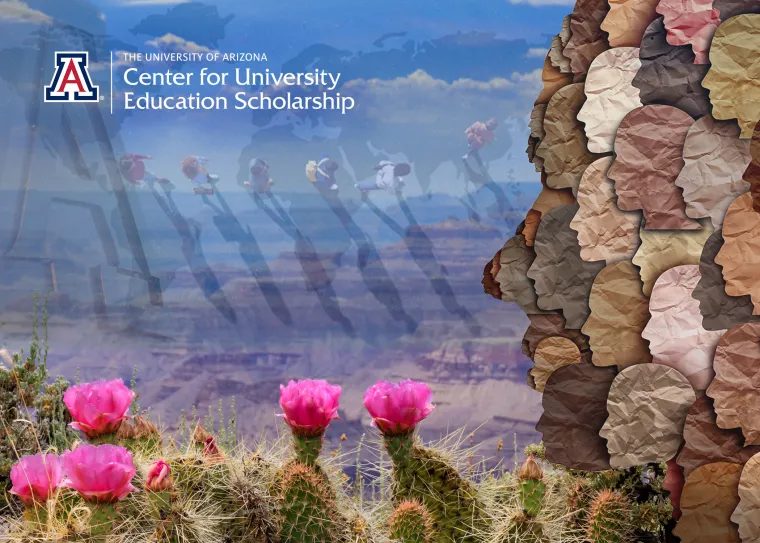When
Where
CUES Mapping Educational Challenges (MECha) workshops explore challenges in university education by bringing together cross-disciplinary experts on the workshop theme.

About the Civic Engagement & Service Learning MECha Workshop
This in person two-day workshop will explore novel questions aiming to expand the scholarship on Civic Engagement and Service Learning (CE/SL) in university education across disciplines. Participants will share challenges and successes, discuss frameworks for maximizing impact of CE/SL work on university education, and explore mechanisms for implementation in UArizona courses and further research. Topics include, but are not limited to:
- The relationship between civic engagement, service learning and “public good”
- The responsibility of land grant and HSI institutions with respect to CE/SL
- Interrogating the nature of the relationship between institution and community in CE/SL
- Ethical considerations around CE/SL in an institutional environment
- Measuring and evaluating impact around CE/SL
- UArizona pathways and barriers related to CE/SL
Organizing Committee
Colin Blakely: Associate Vice President for Strategic Initiatives; Director, School of Art; Professor, Art, UArizona Fine Arts
Ana Cornide: Director, Critical Service Learning & Community Outreach Program; Associate Professor, Spanish & Portuguese, UArizona Humanities
Carlos Gonzales: Assistant Dean, Curricular Affairs; Director, Commitment to Underserved People Program; Associate Professor Family & Community Medicine, UArizona Medicine
Judy Marquez Kiyama: Associate Vice Provost, Faculty Affairs, UArizona Provost; Professor, Educational Policy Studies & Practice, UArizona Education

Workshop Results
MECha_CE-SL_Workshop_FullReport_Final.pdf
Workshop Reading Materials
Calderon, Jose Zapata, and Pollack, Seth S. "Weaving Together Career and Civic Commitments for Social Change." Peer Review : Emerging Trends and Key Debates in Undergraduate Education 17.3 (2015): 16. Web. LINK
Finley, Ashley "Civic Learning and Teaching." Bringing Theory to Practice, 2014. Web. LINK
Harward, Donald W. "Civic Provocations." Bringing Theory to Practice, 2012. Web. LINK
Pollack, Seth S. "Critical Civic Literacy: Knowledge at the Intersection of Career and Community." The Journal of General Education (University Park, Pa.) 62.4 (2013): 223-37. Web. LINK
Reich, Jill N. "Civic Engagement, Civic Development, and Higher Education." Bringing Theory to Practice, 2014. Web. LINK
Workshop Agenda
Wednesday, June 2
9:00-9:30 Registration, breakfast, and networking
9:30-10:00 Opening Session | Introduction and Workshop Charge
Question 1: What does a university learning experience that centers CE/SL look like for our students, our faculty, and our institution? What about for our local communities and community partnerships? Why does it matter for UArizona as a land grant and an HSI institution?
10:00-11:15 Question 1 | Small Group Discussions
11:15-12:00 Question 1 | Whole Group Discussion
12:00-1:00 Lunch
Question 2: What are ethical considerations that must be addressed when developing CE/SL opportunities for students, especially when considering the community, the curriculum, and the institution?
1:00-2:30 Question 2 | Small Group Discussions
2:30-3:00 Coffee break
3:00-4:00 Question 2 | Whole Group Discussion
Thursday, June 3
9:00-9:30 Breakfast and networking
Question 3: How do we make our commitment to CE/SL and social justice explicit in the university learning experience (classes, curriculum, modes of engagement, teaching approaches, clinics, required degree work)? What explicit institutional commitments to CE/SL are needed to support the work we envision?
9:30-11:00 Question 3 | Small Group Discussions
11:00-12:00 Question 3 | Whole Group Discussion
12:00-1:00 Lunch
1:00-2:30 Small Group Discussions | Develop top two recommendations for:
- Advancing CE/SL in the UArizona learning experience, particularly in regards to teaching, faculty capacity building, and land grant/HSI responsibilities
- Making institutional commitments to support/advance CE/SL at UArizona
2:30-3:00 Coffee break
3:00-4:00 Whole Group Discussion: Shaping Recommendations, and Next Steps

